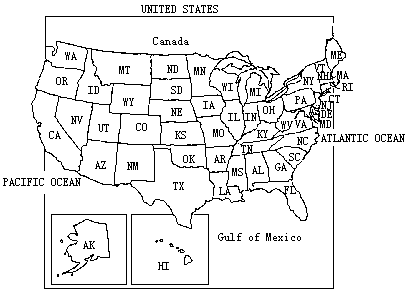
题目列表(包括答案和解析)
| |||||||||||||||||||||||||||||||||||||||||||||||||||||||||||||||||||||||||
| |||||
Does a person from Ohio or Virginia have a better chance of living in the White House than anyone else? It seems that way. Eight out of 40 U. S. Presidents came from Ohio. Eight came from Virginia. William Henry Harrison, the ninth U. S. President, had the best chance of all. Why? He was born in Virginia and then lived in Ohio.

Here is a map of the United States. You will see that Virginia and Ohio are not too far away from each other. New York, Massachusetts, and California are worth noting(注意), too. They each have sent at least three of their native sons to the White House.
Maps are flat (平的) drawings of Earth or parts of it. The map on the above shows the shapes and sizes of the 50 states. Like most U. S. maps, it abbreviates(缩写) the names of the states. Use the map to answer the questions below.
1.President Lyndon Johnson came from the largest state on the Gulf of Mexico. He was from ________ .
[ ]
2.President Jimmy Carter is from Georgia. Which state is below Georgia on the map?
[ ]
3.President Harry Truman was from a state surrounded by Illinois and seven other states. He was from ________ .
[ ]
4.Which area of the United States has more states?
[ ]
5.Which of these states is closest to Canada?
[ ]
完形填空
Here is a story about a clever dog. It was a seeing-eye dog. A seeing-eye dog can help blind (瞎的) people walk along the streets and do many other things.
One day a seeing-dog and a blind man 1 on a bus together. The bus was full of 2 and there were 3 seats left. But one man soon stood up and left his seat. The dog 4 the blind man to the seat, but there was little space (空间) for two people. The dog began to push the people on each side 5 his nose. He pushed and pushed until the people moved and 6 there was 7 space for two people. The blind man then sat down and the dog got up on the seat at his side. The dog 8 down and put his head on the leg of the 9 man. He was very comfortable (舒服的) and soon fell asleep (入睡) . Everyone on the bus 10 at the dog.
1.
[ ]
2.
[ ]
3.
[ ]
4.
[ ]
5.
[ ]
6.
[ ]
7.
[ ]
8.
[ ]
9.
[ ]
10.
[ ]
This year 1 twenty-three hundred teenagers from all over the world will spend about ten months in U. S. 2 . They will attend U. S, schools, meet U. S. teenagers, and form 3 of the real America. At the same time, about thirteen hundred American teenagers will go to other countries to learn new 4 and gain a new understanding of the rest of the world.
Here is a two-way student exchange in action. Fred, nineteen, spent last year in Germany with George's family. 5 , George's son Mike spent a year in Fred's home in America.
Fred, a lively young man; knew little German when he arrived, but after two months' study, the language began to come to him. School was completely different from what he had expected-much 6 . Students rose respectfully when the teacher entered the room. They took fourteen subjects 7 the six that are usual in the United States:There were almost no 8 activities.
Family life, too, was different. The father's word was 9 , and all activities were around the family rather than the individual. Fred found the food too simple at first. 10 , he missed having a car.
“Back home, you 11 some friends in a car and go out and have a good time. In Germany, you walk, but you soon learn to like it.”
At the same time, in America, Mike, a friendly 12 boy, was also forming his idea. “I suppose I should criticize American school,” he says. “It is far too easy by our 13 . But I have to say that I like it very much. In Germany we do nothing but 14 . Here we take part in many outside activities. I think that maybe your schools are better in training for 15. There ought to be some middle ground between the two.”
1.
[ ]
2.
[ ]
3.
[ ]
4.
[ ]
5.
[ ]
6.
[ ]
7.
[ ]
8.
[ ]
9.
[ ]
10.
[ ]
11.
[ ]
12.
[ ]
13.
[ ]
14.
[ ]
15.
[ ]
湖北省互联网违法和不良信息举报平台 | 网上有害信息举报专区 | 电信诈骗举报专区 | 涉历史虚无主义有害信息举报专区 | 涉企侵权举报专区
违法和不良信息举报电话:027-86699610 举报邮箱:58377363@163.com